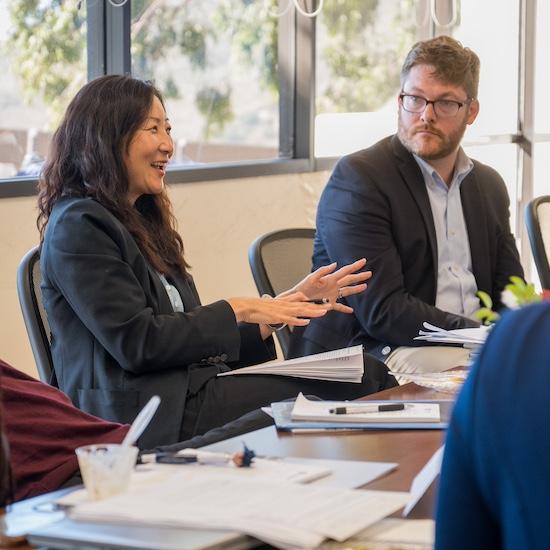On November 7, 2025, the Nootbaar Institute on Law, Religion, and Ethics at Pepperdine Caruso School of Law hosted “Christian Legal Thought from the Margins,” an academic workshop for legal scholars to share their current research projects and reflect on how Christianity informs their work. The gathering was organized by Nootbaar Institute Co-Director and Caruso Law professor Jennifer Koh, University of Florida Levin College of Law professor Christopher Hampson, and Indiana University Maurer School of Law professor Alvin Velazquez.
Attendees shared developing research across a broad range of legal fields, including bankruptcy, tax, labor, criminal law, immigration, and family law. Caruso Law Associate Dean of Academic Affairs Jason Jarvis and event organizer Koh welcomed attendees and explained that the event was inspired by a shared interest in how leading academics are integrating Christian values and principles into their legal scholarship. They also expressed a desire to build community among academics exploring what it means to be a modern Christian scholar and to bring together those who understand Christianity as foundational to their work in law. Jarvis discussed how the workshop tied into Pepperdine’s mission
Jarvis discussed how the workshop tied into Pepperdine’s mission
“This [event] is really what Pepperdine University is about,” said Jarvis. “One of the most important things to us is hosting discussions at the intersection of faith, learning, scholarship, and research. I’m grateful these conversations are happening and believe they are incredibly important.”
“We reached out to you and to others with the goal of bringing together legal researchers who see Christianity as foundational to their scholarship,” added Koh. “We wanted to create an event that united those who use legal scholarship to promote justice, equality, and fairness. We sincerely hope this gathering marks the beginning of a community committed to cultivating care and connection.”
Fuller Theological Seminary professor Soong-Chan Rah opened the workshop by observing that contemporary Christianity often emphasizes individual, triumphant expressions of faith while overlooking biblical lament and the broader community experience, practices he believes are essential for recognizing injustice and amplifying the voices of those in the margins.
“I’m seeing us focus so much on this kind of individualized salvation, individualized redemption, that we sometimes forget there is a redemption that is necessary in the social structure level as well. That is what is so exciting about what you all are doing here today,” shared Rah. “We are confronting evil in its proper geography. If sin and brokenness are in the individual, that’s where we confront them, but if sin and brokenness are in the systems and structures, that’s also where we confront them. And I want to affirm that that confrontation of evil is exactly what you’re talking about, which needs to come from the margins.”
Rah concluded by encouraging participants to use their training and authority to elevate marginalized voices and faithfully challenge systemic injustice. He ended with a prayer, thanking the Lord for calling this group together and asking that their scholarship and advocacy continue to reflect Christian conviction, compassion, and a commitment to justice.
“Thank you for the commitment of our dear friends here who see the important work of scholarship, who see the important work that is necessary in the courts and field of law, and they are doing this out of their convictions of what it means to be a follower of Jesus—following Christian convictions, values, and ethics,” prayed Rah. Soong-Chan Rah opened the workshop with a devotional
Soong-Chan Rah opened the workshop with a devotional
The workshop continued with presentations and proposed ethical solutions to current social issues, including the prevalence and treatment of domestic violence within American Christian communities and the need for affordable housing. Attendees also enjoyed a panel discussion that integrated Christian legal thought with contemporary legal challenges, offering perspectives rooted in ethics, doctrine, and lived experience.Researchers workshopped their early-stage projects in an effort to collaboratively develop and further refine emerging ideas.
Following closing remarks, the day concluded with an evening meal where participants continued building relationships and reflecting informally on the insights and themes shared throughout the workshop. “I am grateful that the Nootbaar Institute could host this initial workshop and look forward to continuing to build a community of legal scholars who are interested in Christianity, law, and justice,” shared Koh.
For more information on the institute and details on upcoming events, visit the Nootbaar Institute website.
310.506.4000
Copyright © 2025 Pepperdine University
